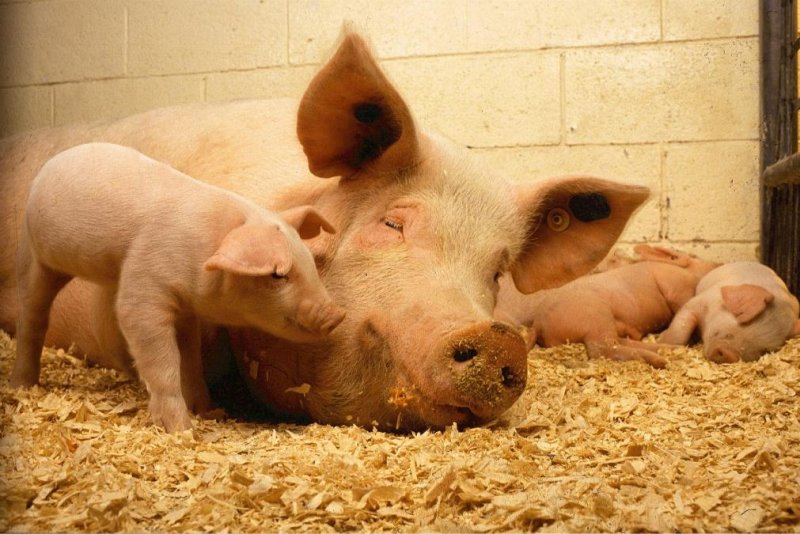A new California law requires all pork and veal sold in the state come from animals raised in cages larger than the industry standard. Pixabay
EVANSVILLE, Ind., Oct. 9 (UPI) -- An industry group is trying to stop California from requiring that out-of-state farmers raise their animals in more spacious cages if they want to sell animal products in the state.
Beginning Jan. 1, only veal from calves raised with at least 43 square feet of floor space may be sold in California, regardless of where it comes from. Breeding pigs, known as sows, must have at least 24 square feet, and egg-laying hens must have 1 square foot.
"Those numbers are unrealistic," said Mark Dopp, the senior vice president and general counsel for the North American Meat Institute. "Forty-three square feet is an enormous amount of space, and 24 square feet is also a lot. Both numbers greatly exceed the industry standard."
The mandate comes from a new law California voters passed in November called Proposition 12, the Prevention of Cruelty to Animals Act. The North American Meat Institute filed a lawsuit against the state Friday on the grounds that it is unconstitutional -- specifically that it violates the commerce clause.
"California has no authority to regulate the conditions under which farm animals are housed outside its borders," the lawsuit states.
The suit also claims that the law discriminates against out-of-state farmers, as in-state producers already adhere to stricter space requirements thanks to laws passed in 2008.
When filing the lawsuit, the institute asked the court for an immediate injunction, Dopp said. The group hopes to have a hearing on that request within a few weeks.
California voters passed Proposition 12 with 63 percent in favor. Its supporters hailed it a victory for animal welfare and rights.
"Millions of veal calves, mother pigs and egg-laying hens will never know the misery of being locked in a tiny cage for the duration of their lives," said Kitty Block, the acting president and CEO of the Humane Society of the United States, one of the proposition's key supporters.
But the meat industry warned that the regulations would create havoc in the market.
Veal and pork producers must now decide between making costly renovations to their animal housing or missing out on the lucrative California market, Dopp said. And that is no small omission.
California has the largest gross domestic product of any state, and its economy is a powerhouse even when compared to various nations. It's the fifth-largest in the world, behind only the combined United States, China, Japan and Germany.
As more farmers move to comply with the space regulations, pork and veal production will likely decrease and become more costly to consumers, economists say. This will be especially true in California, according to the state's Legislative Analyst's Office.
"This measure would result in many farmers having to remodel or build new housing for animals," the agency's report said. "This housing also could be more expensive to run on an ongoing basis. Much of these increased costs are likely to be passed through to consumers."
What's more, it may take several years for enough farms to make the switch to more spacious cages, which would lead to a significant short term shortage of those items, the agency said.
"These shortfalls would lead to an increase in prices until farmers can meet demand," it said.
Meat industry groups say this price increase could hit consumers outside California as well, as most of the nation's pork, veal and egg production occurs outside the state.
"Some hog farmers likely would go out of business," the National Pork Producers Council said in a statement. "Of course, animal rights groups not only know this, they count on it to achieve their goal of significantly reducing meat consumption in America."
The egg industry, which is not represented in the Meat Institute's lawsuit, faces similar dilemmas.
"Some producers who supply California might decide to stop supplying California and try to supply the rest of the country, instead," said Maro Ibarburu, an associate scientist-business analyst at the Egg Industry Center located at Iowa State University.
The North American Meat Institute's key concern is the precedent this law could set.
"It sets a precedent for other states to impose other requirements," Dopp said. "But, what if those states decide 24 feet isn't enough -- that it should be 26? And then another state says 30. And you end up with a patchwork of different requirements that inhibit the flow of commerce."















